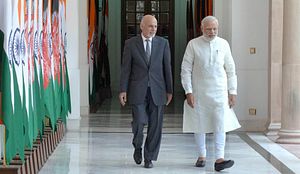Never has a song so accurately depicted the precarious situation Afghanistan finds itself in, a country at the behest of its neighbors. “Stuck in The Middle With You,” performed by the Stealers Wheel band, sums up the frustrations and trepidation of the war torn country.
Afghanistan, centrally located as the gateway to Central and Southwest Asia has always been at the mercy of its neighbors. Its geostrategic importance has made it the proxy battlefield of great powers–landlocked and largely underdeveloped frontier lands have made Afghanistan a target of neighboring countries. Smuggling routes for precious gems, opium, and black market goods snake their way into Iran, Uzbekistan, Turkmenistan, and Pakistan, fueling militancy and criminal enterprises in the border regions.
Destabilization of Afghanistan’s central government has been the name of the game for Afghanistan’s neighbors seeking to benefit from a Kabul bent to their will and unable to crack down on the black market smuggling.
Understanding Afghanistan’s unique situation, Ashraf Ghani has set out on a mission to wheel in Afghanistan’s neighbors. Internationalism has become a cornerstone of Ghani’s administration–building economic interdependence between Afghanistan and her neighbors, Ghani seeks to build shared interests with her former antagonists in the hopes that shared economic interests will translate into friendly policies towards Kabul.
Ghani has been criticized for his failure to coral and court Afghanistan’s complex patronage networks, including from within his own government, but his most lasting achievement will be the regional ties he has forged, a long term solution towards Afghanistan’s seemingly endless problems and conflict.
Last week’s arrival of the first train from Haimen, China to Hairatan, Afghanistan is an example of Ghani’s internationalism and regional bridge building. The train carrying roughly $4 million worth of goods took just two weeks to complete the 4,600 mile journey, in comparison to the three to six months it takes for Afghanistan to move its exports through Pakistan’s unstable and insecure roads. Slated to deliver goods twice a month, the new train service between China and Afghanistan is a positive step in Afghanistan reducing its dependence on Pakistani trade routes for its estimated value of $600 million in Afghan exports.
“The investments boost China’s position as Afghanistan’s biggest foreign investor,” said Sayed Masood, an economics professor at Kabul University. “The country now seeks to be Afghanistan’s biggest trading partner.”
Turkmenistan has been increasing economic cooperation with Afghanistan, including increasing electricity sales, the building of the Turkmenistan-Afghanistan-Pakistan-India (TAPI) pipeline, and new rail networks for Afghanistan goods. The Turkmen-Afghanistan-Tajikistan (TAT) railway is designed to bolster economic cooperation between Afghanistan and Central Asia.
“At present, the railway line has been laid till the Imamnazar station,” said a government spokesman. “In parallel, work is underway on laying power lines, construction of infrastructure facilities at the Gulistan and Imamnazar stations, construction of two major railway bridges at this track.”
Ghani reiterated the importance of Turkmenistan’s partnership in a visit last summer, “Besides transiting Turkmenistan’s gas to Pakistan and India, we hope to serve as a transit state for China as well. Afghanistan is willing to import electricity from Turkmenistan, and we want to function as the center of power export to South Asia. Meanwhile, Afghanistan is eager to transit Turkmenistan’s energy to Tajikistan and China by way of its territory,” President Ghani added.
Since the signing of the nuclear agreement between the West and Iran, Ghani has sought to deepen ties with Iran. Historically, Iran has served as nexus for the transportation and smuggling of drugs and facilitating instability in Afghanistan’s border regions. Seeking to mend past historical grievances and tie Tehran and Kabul economically, Afghanistan signed a recent mining agreement with Iran, allowing Iran to rights to exploration and exploitation of Afghanistan’s valuable mineral wealth, valued near $1 trillion.
Furthermore, described as a game changer in the region, Afghanistan, India, and Iran inked a trilateral agreement on developing the Iranian port of Chabahar. The port would provide access for Indian and Afghan goods to be shipped up to Central Asia, bypassing Afghanistan and India’s biggest antagonist, Pakistan.
Continuing his internationalism agenda, Ghani starts a two day trip tomorrow to India to visit Prime Minister Narenda Modi. Discussions will likely focus on Indian military assistance to Afghanistan and further development and support of Afghanistan fledgling air force, to include more deliveries and technical support of Mi-25 gunships.
Ghani’s internationalism is paramount to Afghanistan recovering from decades of war. The economic ties between Afghanistan and her neighbors are designed to coerce former antagonists through shared interests to support the Kabul based government, and not to hedge their bets against its collapse. However, as Afghanistan has rapidly sought out regional partnerships beyond Pakistan, Pakistan has increased its interference in the country through regional proxies and support of Taliban militant groups. Ghani’s endeavors have not come without cost.

































